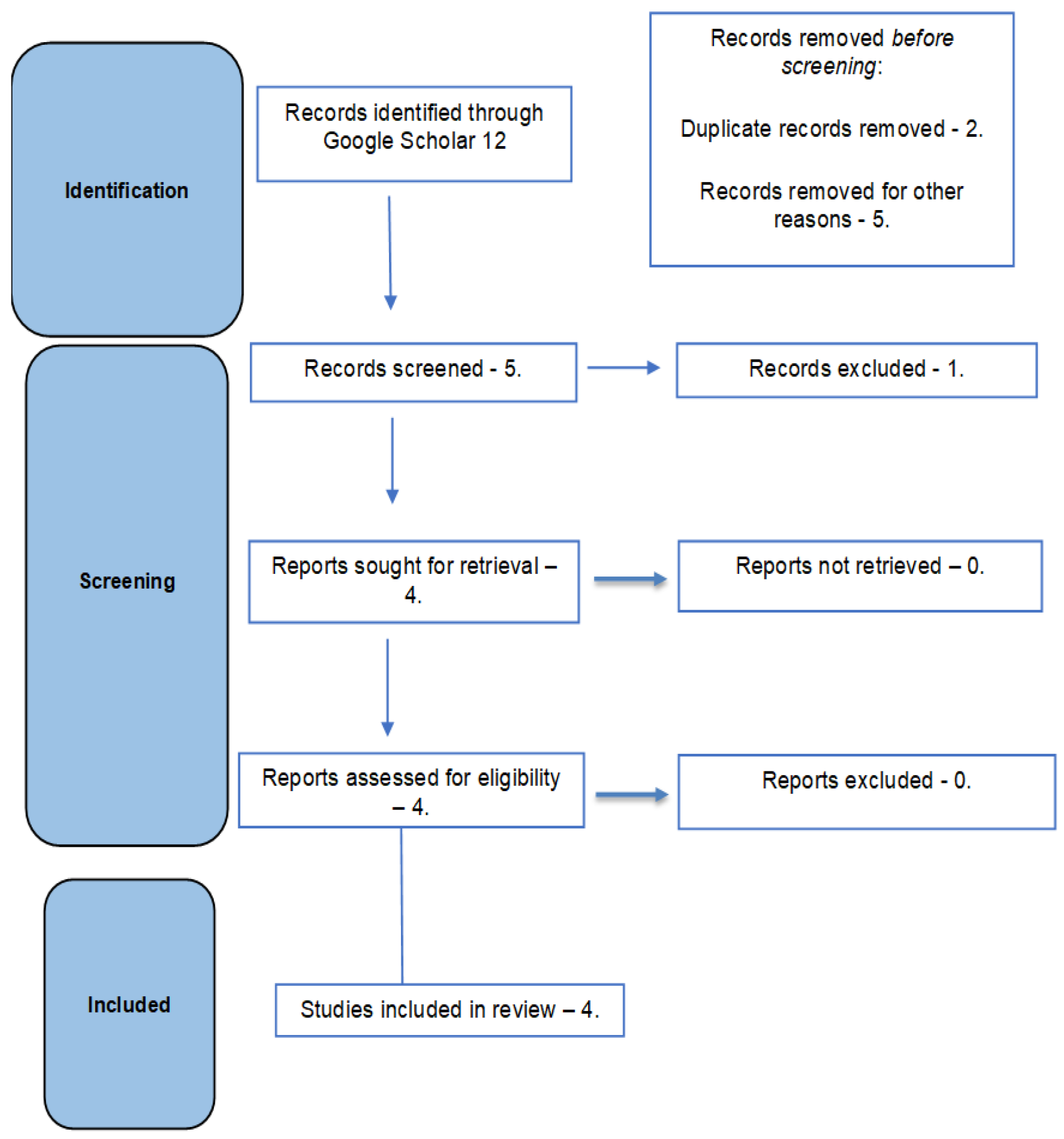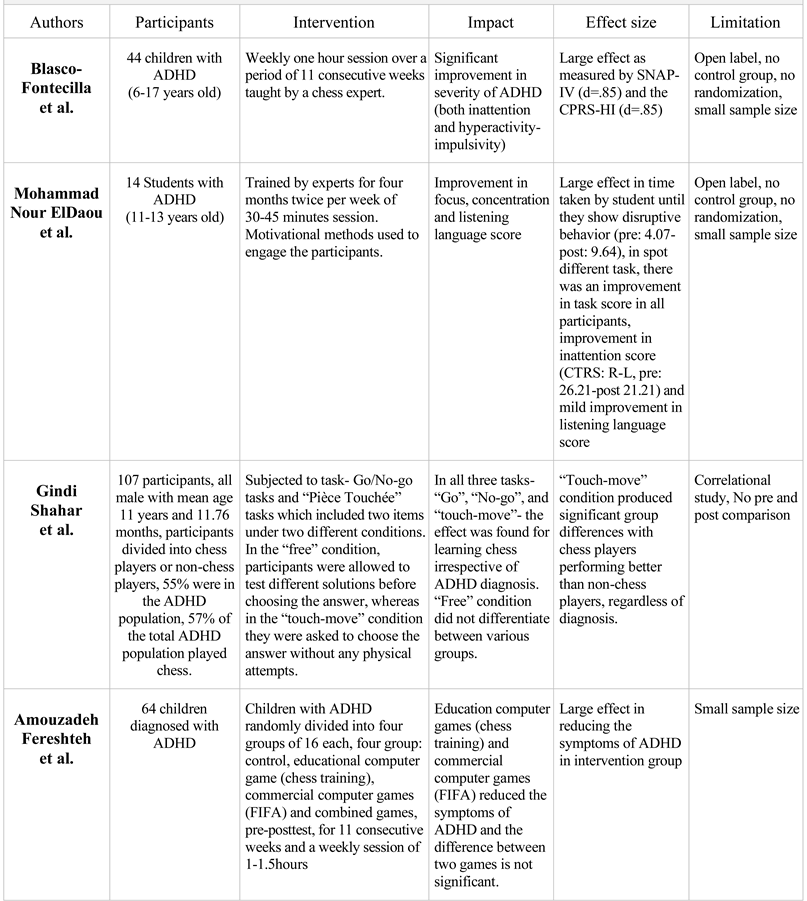Evaluating the Effectiveness of Chess as a Therapeutic Tool in the Comprehensive Management of ADHD
Abstract
Introduction
Materials and Methods
Results
Discussions
Limitations and future directions
Conclusions
Acknowledgments
Compliance with ethical standards
Conflict of interest disclosure
References
- Posner, J.; Polanczyk, G.V.; Sonuga-Barke, E. Attention-deficit hyperactivity disorder. Lancet. 2020, 395, 450–462. [Google Scholar] [CrossRef] [PubMed]
- Arat, A.; Östberg, V.; Burström, B.; Hjern, A. ADHD medication in offspring of immigrants - does the income level of the country of parental origin matter? BMC Psychiatry. 2018, 18, 3, Published 2018 Jan 8. [Google Scholar] [CrossRef]
- Anghel, D.M.C.; Anghel, E.E.; Stan, M.; Tudor, G.; et al. Psychological and psychiatric characterization of various groups of drugs users. J Mind Med Sci. 2022, 9, 255–265. [Google Scholar] [CrossRef]
- Rodrigo-Yanguas, M.; Martin-Moratinos, M.; Gonzalez-Tardon, C.; Blasco-Fontecilla, H. Virtual Reality and Chess. A Video Game for cognitive training in patients with ADHD. Available from: https://ceur-ws.org/Vol-2719/paper20.pdf.
- Rodrigo-Yanguas, M.; Martin-Moratinos, M.; Menendez-Garcia, A.; et al. A Virtual Reality Serious Videogame Versus Online Chess Augmentation in Patients with Attention Deficit Hyperactivity Disorder: A Randomized Clinical Trial. Games Health J. 2021, 10, 283–292. [Google Scholar] [CrossRef] [PubMed]
- Amouzadeh, F.; Honarmand, P.; Moghadamzadeh, A.; Rostami, R. The Impact of Commercial and Educational Computer Games on the ADHD Symptoms in Students with ADHD. Alborz Univ Med J. 2021, 10, 285–296, https://aums.abzums.ac.ir/article-1-1363-en.html. [Google Scholar]
- Blasco-Fontecilla, H.; Gonzalez-Perez, M.; Garcia-Lopez, R.; Poza-Cano, B.; Perez-Moreno, M.R.; de Leon-Martinez, V.; Otero-Perez, J. Efficacy of chess training for the treatment of ADHD: A prospective, open label study. Rev Psiquiatr Salud Ment. 2016, 9, 13–21. [Google Scholar] [CrossRef] [PubMed]
- Gindi, S.; Pilpel, A. Pièce Touchée!: Te Relationship Between ChessPlaying Experience and Inhibition. Psychology in Russia: State of the Art. 2020, 13, 133–146. [Google Scholar] [CrossRef]
- ElDaou, B.M.N.; El-Shamieh, S.I. The Effect of Playing Chess on the Concentration of ADHD Students in the 2nd Cycle. Procedia Soc Behav Sci. 2015, 192, 638–643. [Google Scholar] [CrossRef]
- Delgado-Gómez, D.; Sújar, A.; Ardoy-Cuadros, J.; et al. Objective Assessment of Attention-Deficit Hyperactivity Disorder (ADHD) Using an Infinite Runner-Based Computer Game: A Pilot Study. Brain Sci. 2020, 10, 716. [Google Scholar] [CrossRef] [PubMed]
- Fatima, S.; Bashir, M.; Khan, K.; Farooq, S.; Shoaib, S.; Farhan, S. Effect of presence and absence of parents on the emotional maturity and perceived loneliness in adolescents. J Mind Med Sci. 2021, 8, 259–266. [Google Scholar] [CrossRef]
- Budur, K.; Mathews, M.; Adetunji, B.; Mathews, M.; Mahmud, J. Non-stimulant treatment for attention deficit hyperactivity disorder. Psychiatry (Edgmont). 2005, 2, 44–48. [Google Scholar] [PubMed]
- Sujar, A.; Bayona, S.; Delgado-Gómez, D.; et al. Attention Deficit Hyperactivity Disorder Assessment Based on Patient Behavior Exhibited in a Car Video Game: A Pilot Study. Brain Sci. 2022, 12, 877, Published 2022 Jul 1. [Google Scholar] [CrossRef] [PubMed]
- Kubiszyn, T.; Mire, S.; Dutt, S.; Papathopoulos, K.; Burridge, A.B. Significant differences in pediatric psychotropic side effects: Implications for school performance. Sch Psychol Q. 2012, 27, 4–28. [Google Scholar] [CrossRef] [PubMed]
- Ginsburg, K.R.; American Academy of Pediatrics Committee on Communications; American Academy of Pediatrics Committee on Psychosocial Aspects of Child and Family Health. The importance of play in promoting healthy child development and maintaining strong parent-child bonds. Pediatrics. 2007, 119, 182–191. [Google Scholar] [CrossRef] [PubMed]
- Medalia, A.; Saperstein, A. The role of motivation for treatment success. Schizophr Bull. 2011, 37, S122–S128. [Google Scholar] [CrossRef] [PubMed]
- Cordier, R.; Bundy, A.; Hocking, C.; Einfeld, S. A model for play-based intervention for children with ADHD. Aust Occup Ther J. 2009, 56, 332–340. [Google Scholar] [CrossRef] [PubMed]
- Demily, C.; Cavézian, C.; Desmurget, M.; Berquand-Merle, M.; Chambon, V.; Franck, N. The game of chess enhances cognitive abilities in schizophrenia. Schizophr Res. 2009, 107, 112–113. [Google Scholar] [CrossRef] [PubMed]
- Introduction of the programme ‘Chess in School’ in the educational systems of the European Union. Declaration of the European Parliament of 15 March 2012 on the introduction of the programme ‘Chess in School’ in the educational systems of the European Union Available from: https://www.europarl.europa.eu/doceo/document/TA-7-2012-0097_EN.html. 15 March.
- Schmäl, C.; Becker, K.; Berg, R.; et al. Pediatric psychopharmacological research in the post EU regulation 1901/2006 era. Z Kinder Jugendpsychiatr Psychother. 2014, 42, 441–449. [Google Scholar] [CrossRef] [PubMed][Green Version]

 |
Disclaimer/Publisher’s Note: The statements, opinions and data contained in all publications are solely those of the individual author(s) and contributor(s) and not of MDPI and/or the editor(s). MDPI and/or the editor(s) disclaim responsibility for any injury to people or property resulting from any ideas, methods, instructions or products referred to in the content. |
© 2023 by the author. 2023 Neilay Krishna Agarwal
Share and Cite
Agarwal, N.K. Evaluating the Effectiveness of Chess as a Therapeutic Tool in the Comprehensive Management of ADHD. J. Mind Med. Sci. 2023, 10, 191-195. https://doi.org/10.22543/2392-7674.1405
Agarwal NK. Evaluating the Effectiveness of Chess as a Therapeutic Tool in the Comprehensive Management of ADHD. Journal of Mind and Medical Sciences. 2023; 10(2):191-195. https://doi.org/10.22543/2392-7674.1405
Chicago/Turabian StyleAgarwal, Neilay Krishna. 2023. "Evaluating the Effectiveness of Chess as a Therapeutic Tool in the Comprehensive Management of ADHD" Journal of Mind and Medical Sciences 10, no. 2: 191-195. https://doi.org/10.22543/2392-7674.1405
APA StyleAgarwal, N. K. (2023). Evaluating the Effectiveness of Chess as a Therapeutic Tool in the Comprehensive Management of ADHD. Journal of Mind and Medical Sciences, 10(2), 191-195. https://doi.org/10.22543/2392-7674.1405



